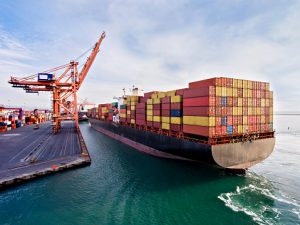
BRF OneFoods, a subsidiary of BRF in Brazil focusing on all global halal food markets, is one of the largest food producers in Brazil and has established a strong foothold in the Middle East market with its Sadia brand, which accounts for roughly a third of the multinational’s total exports.
It produces most of its goods in Brazil, exporting to the 42 halal markets in which its Sadia and other brands are sold. There are nine factories in Brazil, three in Turkey, one in Malaysia and one in Abu Dhabi.
The US $160 million facility produces 70,000 tonnes of frozen foods annually for BRF OneFood’s FPP (food processing products). These include everything from Sadia’s chicken nuggets to its beef burger patties.
BRF OneFoods’ Abu Dhabi factory, where it produces Sadia’s frozen foods range.
Across the GCC and in Turkey and Malaysia BRF OneFoods oversees control of its supply chain, through which it throughputs approximately 3 million tons of food annually. “BRF OneFoods controls the quality of all its products through vertical integration of the full supply chain including dedicated farms, privately owned feed mills, grain storage facilities, hatcheries, slaughterhouses and distribution centres,” says Walid El Hajj, regional logistics manager for BRF OneFoods, in the MENASAT region.
“The majority of our industrial units are located in Brazil, regionally we have processing factories in the UAE at Khalifa Industrial Zone Abu Dhabi (KIZAD) and in Malaysia, as well as five production facilities in Turkey.” BRF OneFoods has several management tools that enable it to work efficiently while maintaining high quality standards.

BRF OneFoods delivers across the region within 12 hours of an order from retailer.
“To give an example, we have recently introduced two Global Programs already running in Brazil; the Logistics Excellence program and the Supplier Integration program,” says El Hajj. “Through this, we have created an educational course for the delivery staff called ‘Motorista’, which aims to train our 3PL drivers on our business model and our digital systems.”
“Our aim with these programs is to help the drivers integrate into our culture to manage our customers and our products with high level of service, quality and safety,” he explains. “We have introduced a qualification metric for truck drivers so we can evaluate their performance assess their driving quality and develop their career path.” This program has been rolled out to all its 3PL partners in the GCC markets.
Our strategy is to serve our client within 12 hours of all orders across GCC, Malaysia and Turkey“Our strategy is to serve our client within 12 hours of all orders across GCC, Malaysia and Turkey. As for the remaining markets, we export directly from our factories to our distributors”, explains El Hajj. This is what El Hajj means when he says that BRF OneFoods retains full control over its supply chain in the GCC: “We have a proprietary intelligence platform that enables us to track every shipment live. From this platform we can see every product from every 3PL being delivered to each customer,” he explains.
BRF OneFoods tracks its entire GCC supply chain network from a control room in Dubai.
“Every driver has a mobile work plan that records location, progression and deliveries, and every truck also has telematics equipment that tracks the temperatures and drivers’ behaviour,” he continues. “This system was put in place a year ago; however, we started developing it three years ago. We’re one of the first food companies in the region that is using such a system,” El Hajj adds.
It had an immediate impact on our operations, increasing on-time deliveries and significantly reducing costs“It had an immediate impact on our operations, increasing on-time deliveries and significantly reducing costs. It allows us to not only take immediate action if there’s a problem, but it also gives us the capability to be proactive.”
BRF OneFoods works with its 3PL to help them adapt this system into their operations. In fact, all warehouses in the key markets with ‘own distribution’ have been developed and built around the needs of BRF OneFoods and its standards.

BRF OneFoods’ regional partner in Dubai is Global Shipping & Logistics.
Through this close relationship, the 3PLs have helped BRF OneFoods set itself apart in the market. “We are one of the few poultry companies in this region to fully control the production and distribution of our products from farm to fork so that we can guarantee our customers that our products meet the highest standards of quality from start to end,” says El Hajj.
While BRF OneFoods is one of thefirst food companies to be doing this in the region, El Hajj sees the practise catching on fast due to the benefits that it provides. “Digitalisation is the most significant trend impacting food logistics worldwide and there is no doubt that the region is following the global movement,” he says.
At BRF OneFoods we have already implemented a digital platform to fully digitalise our supply chain in the region“At BRF OneFoods we have already implemented a digital platform to fully digitalise our supply chain in the region. The implementation of this tool has enabled the company to increase productivity, operate in a greener way as well as uphold strict safety standards.” El Hajj also predicts that blockchain will play an increasingly large role in the region.
“We have in fact already started a pilot program in Brazil that makes use of the technology. Through this technology, we aim to improve food traceability and ensure higher levels of transparency,” he adds. This is essential given the nature of the local markets in which BRF OneFoods is operating.
“Every country has its own unique set of rules and regulations, but the market is moving towards more transparency and governments are looking to protect the consumers by increasing the traceability of the region’s food products, so that consumers can follow the journey of their food from farm to fork and fully understand what happens every step of the way,” says El Hajj.
And through its supply chain integration and digitalisation; BRF is able to fully comply with these diverse regulations, and the growing importance of traceability.
“As we are fully integrated from farm to fork, we have the ability to customize any process,” he explains. “Therefore, our production and distribution processes are developed with full compliance as per the countries’ regulations and customers’ and consumers’ requirements.”





